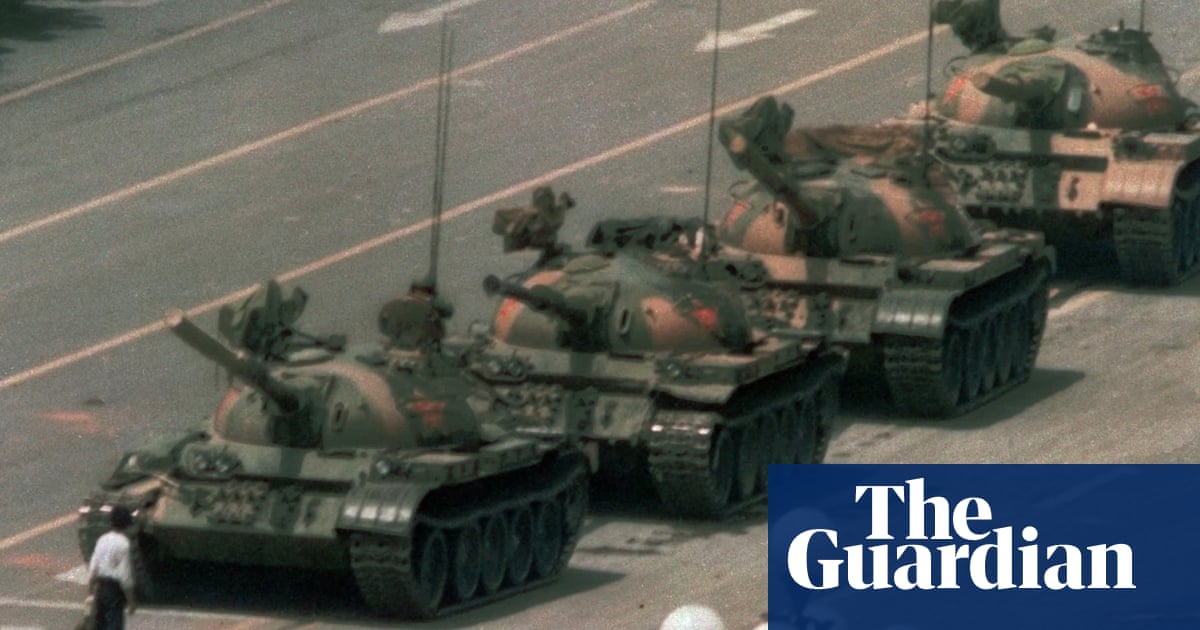The world will never forget theTiananmen Square massacre, the US secretary of state and Taiwan president have said on the 36th anniversary of the crackdown, which China’s government still tries to erase from domestic memory.
There is no official death toll but activists believe hundreds, possibly thousands, were killed by China’s People’s Liberation Army in the streets around Tiananmen Square, Beijing’s central plaza, on 4 June 1989.
“Today we commemorate the bravery of the Chinese people who were killed as they tried to exercise their fundamental freedoms, as well as those who continue to suffer persecution as they seek accountability and justice for the events of June 4, 1989,” said Marco Rubio, the US’s top diplomat, in a statement.
“The [Chinese Communist party] actively tries to censor the facts, but the world will never forget.”
In a Facebook post, Taiwan’s president, Lai Ching-te, also praised the bravery of the protesters.
“Authoritarian governments often choose to silence and forget history, while democratic societies choose to preserve the truth and refuse to forget those who gave their lives – and their dreams – to the idea of human rights,” Lai said.
Ahead of the 1989 massacre protesters had been gathering for weeks in the square to call for democratic reforms to the CCP. The student-led movement attracted worldwide attention, which turned to horror as tanks rolled into the square to clear the encampment. Several protesters were also killed ata smaller demonstration in Chengdu, a city in south-west China.
The date of 4 June remains one of China’s strictest taboos, and the Chinese government employs extensive and increasingly sophisticated resources to censor any discussion or acknowledgment of it inside China. Internet censors scrub even the most obscure references to the date from online spaces, and activists in China are often put under increased surveillance or sent on enforced “holidays” away from Beijing.
New research from human rights workers has found that the sensitive date also sees heightened transnational repression of Chinese government critics overseas by the government and its proxies.
The report published on Wednesday by Article 19, a human rights research and advocacy group, said that the Chinese government “has engaged in a systematic international campaign of transnational repression targeting protesters critical of the Chinese Communist party,” with Uyghurs, Tibetans and Hongkongers particularly likely to be affected.
The report citedFreedom House researchin 2023, which found that China had been responsible for about 30% all recorded acts of physical transnational repression since 2014.
“Protesters targeted by [transnational repression] frequently live in fear of surveillance; targeting; abduction and forced repatriation, especially around embassies and consulates; and ‘collective punishment’ retaliation against relatives still in China, which also leads people to cut ties with their family,” the report said.
The Article 19 researchers found that, with Tiananmen Square vigils snuffed out in China, pro-CCP agents appear to be targeting commemorations in other parts of the world.
In 2022, a replica of a statue known as the “Pillar of Shame”, by Danish artist Jens Galschiøt, was vandalised in Taipei. The statue is designed to memorialise the people who died on 4 June 1989. The original was on display at the University of Hong Kong for 23 years before it was removed by university authorities in 2021.
For many years, Hong Kong, and to a lesser extent Macau, were the only places on Chinese territory where the event could be commemorated.
But since the 2019 pro-democracy protests and the ensuing crackdown on civil liberties in Hong Kong, the annual 4 June vigil in Victoria Parkhas been banned. In recent years some high profile activists have been prosecuted over attempts to mark the day. For the last three years a government-sponsored food carnival has been held on the site during the week of the anniversary.
On Tuesday there was a heavy police presence in Causeway Bay, near the park, Hong Kong Free Press reported. A performance artist, Chan Mei-tung, was stopped and searched, and later escorted from the area by police. She was standing on the road chewing gum, according to the outlet. In 2022 Chan was arrested on after she stood in the same area peeling a potato.
On Tuesday Hong Kong’s chief executive, John Lee, warned that any activity conducted on Wednesday must be “lawful”, but was not specific. A key criticism of Hong Kong’s national security laws are that they are broad and the proscribed crimes are ill-defined.
One of the few groups of people in China who are still outspoken about the events of 36 years ago are the rapidly ageing “Tiananmen Mothers”, parents of young people killed in the massacre, who have called for an official reckoning.
One of the founding members, 88-year-old Zhang Xianling, gave a rare interview this year with Radio Free Asia, saying that she still lives under close surveillance. Zhangsaid: “I don’t know why they are so afraid of me. I am 88 years old and I have to use a wheelchair if I can’t walk 200 metres. Am I that scary?”
Earlier this week Li Xiaoming, an ex-PLA officer who has lived in Australia for 25 years, gave an interviewto Taiwan media, about his involvement at the Tiananmen crackdown as a junior soldier. Li said he was compelled to talk “as a warning to the world”, and also toTaiwan which is facing the threat of Chinese annexation.
“Although the CCP leadership sees the 4 June incident as something shameful, what they learned from it is the need for strict control – eliminating any sign of unrest early on, controlling and blocking public opinion, and brainwashing to people. They work to crush all instability at the earliest stage,” he said according to CNA’s translation.
